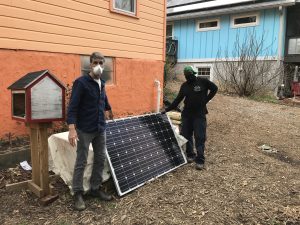AIRE’s mentor was among the founders of the first Earth Day in Berkeley [1]. He argued that doing good work that benefits people and communities everyday would be more authentic and beneficial than a mere one day celebration. With his axiom in mind, let’s not be nihilistic about mental health in the title because, on the contrary, we always have choices, so here’s the “do good, feel good” part first-

What about mental health? Almost six years ago, I came across an Esquire Magazine article that gave voice to what I’d been feeling evermore intensely since the birth of my daughter in 1996– how to deal with the elephant in the room without getting depressed. That elephant is the broad crisis of justice and sustainability. Parenthood gave me a chance to see selflessly (and by definition, very selfishly too) into the future; to see intergenerational equity in a deeply personal way. “Ballard of the Sad Climatologists,” profiled Jason Box, a climatologist, and probed the question of how frontline climate researchers were coping with their subject. After all, Box had a front row seat watching Greenland’s glaciers melt. So it looked at how the scientists were coping emotionally while bearing witness to something utterly unimaginable, and not the climate science itself. It was really the first media piece I’d seen to interrogate the mental health of those working in the clutch of climate change [2].
It’s common nowadays for mental health to be the central story, only now it’s my daughters’ generation expressing emotions too, not just parents or scientists. A few days ago I saw an article in Asheville’s Mountain Xpress featuring a young climate activist named Victoria Estes and a minister named Scott Hardin-Nieri of the Creation Care Alliance. Their stories bring it closer to home here in the N.C. mountains, far from Greenland’s radical melt. What Estes and Hardin-Nieri have in common is they’re both focused on solutions of various sorts and are mindful of community and self-care. [3]
Eco-anxiety is a real thing even though it’s not quite yet recognized in the DSM. Mental health fields are catching on though, as Truthout reports:
Climate anxiety and grief are what [Leslie] Davenport called “disenfranchised” emotions. As a society, we don’t yet make space for it as a valid emotional response; not in the same ways that we would for, say, grief over the death of a family member. “It’s prevalent, but no one’s allowed to speak up,” she said. [4]
It isn’t just climate anxiety or eco-anxiety for many of us. Regrettably, human suffering takes many forms. In the midst of a global pandemic, a tumultuous political year, mass shootings, mass poverty, racism, and growing inequality it might be easy to put climate on the back burner, because, yes these are also trauma and grief-producing events. We do this at our own collective peril as the World Meteorological Organization has just reported [5]. Moreover though, we can’t just segment grief into neat little “issues” checkboxes; we live in a complex world in which the dots eventually all connect.
Pain is everywhere [6] yet despite its pervasiveness, we have healthful outlets. This is where I want to get back to the “do good, feel good” remedy I’m proposing here. I’m not saying that supporting or becoming actively involved in Burton Street’s community-based solar work is the same as therapy. Maybe it’s better. Here’s a community and a group of leaders who’ve been doing the hands-on work of healing intergenerational trauma this community has shouldered for generations. And, they’re showing the rest of us how to persevere and “make a way out of no way” to change cultures and mental models that have entrapped us. Here’s our last post on Burton Street solar, just so you know YOU CAN HELP.
——
[1] I am referring to Dr. S. Loren Cole. https://aire-nc.org/2018/12/14/seeing-systems-loren-cole-inquiring-systems-and-winter-solstice/ and ; https://aire-nc.org/2019/04/23/the-greenwashing-of-earth-day/
[2] See, “Ballard of the Sad Climatologists” Esquire. August 2, 2015. An interview with the author is here- https://soundcloud.com/esquiremag/struggle-of-climate-scientists. Jason Box isn’t the only high profile climatologist. James Hansen sounded the alarm decades ago. Michael Mann gave us the frightening “hockey stick” curve depicting the rapid rise in CO2. All have been targeted and smeared by powerful fossil fuel interests.
[3] Mtnxpress article- https://mountainx.com/news/community-news/climate-change-sparks-mental-health-concerns/ ; See also Scott Hardin-Nieri featured in The Guardian– https://www.theguardian.com/environment/2021/apr/20/the-rev-scott-hardin-nieri-north-carolina-climate-action
[4] Truthout piece- https://truthout.org/articles/therapists-are-seeing-more-patients-struggle-with-climate-anxiety/
[5] This doesn’t diminish the existential challenge we face however. World Meteorological Organization’s 2020 climate report https://public.wmo.int/en/media/news/2021-%E2%80%9Cmake-or-break-year%E2%80%9D-climate-action
[6] See https://aire-nc.org/2021/02/19/pain-and-notes-in-a-parking-lot-the-healing-properties-of-community-solar/